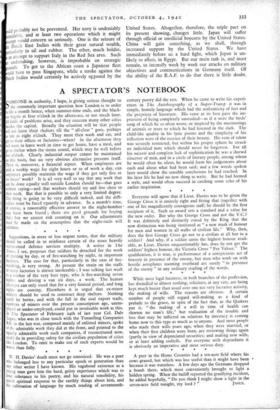W. H. Davies' death must not go unnoticed. He was
a poet who belonged less to any particular epoch or generation than Illy other writer I have known. His vagabond existence as a Young man gave him the hard, gritty experience which was to lend substance to his poetry, and his natural sensibility, his quick spiritual response to the earthly things about him, and his cultivation of language by much reading of seventeenth- century poetry did the rest. When he came to write his experi- ences in The Autobiography of a Super-Tramp it was in simple, homely language which had the authenticity of fact and the propriety of literature. His verse at its best gave the im- pression of being completely unstudied—as if it were the birds' song of which he so often wrote, or inspired by the murmurings of animals or trees to which he had listened in the dark. The child-like quality in his lyric poems and the simplicity of his reflection were of the essence of their beauty. His vein of talent was severely restricted, but within his proper sphere he struck an individual note which should never be forgotten. For all his naivete and complete lack of sophistication he was a shrewd observer of men, and in a circle of literary people, among whom he would often be silent, he would form his judgements about each and about what had been said; and a few words spoken later would show the sensible conclusions he had reached. In his later life he had no new thing to write. But he had formed a style, and would often succeed in catching some echo of his earlier inspiration.
* * *


























 Previous page
Previous page